The Microbial Gene Editing Services Market is estimated to be valued at USD 9.0 billion in 2025 and is projected to reach USD 51.3 billion by 2035, registering a compound annual growth rate (CAGR) of 19.0% over the forecast period.
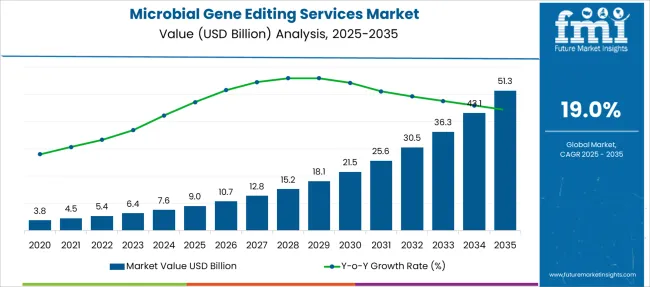
| Metric | Value |
|---|---|
| Microbial Gene Editing Services Market Estimated Value in (2025 E) | USD 9.0 billion |
| Microbial Gene Editing Services Market Forecast Value in (2035 F) | USD 51.3 billion |
| Forecast CAGR (2025 to 2035) | 19.0% |
The microbial gene editing services market is expanding rapidly as precision genome engineering becomes a foundational tool in modern biotechnology. This growth is being driven by escalating demand for synthetic biology solutions, microbial strain optimization, and sustainable production pathways across pharmaceuticals, agriculture, and industrial biotech.
Regulatory support for microbial-based therapeutics and biosolutions, along with reduced turnaround time for DNA sequencing and synthesis, is further accelerating adoption. Partnerships between biotech companies and academic institutions are catalyzing innovation and service expansion, especially in therapeutic microbiome research and enzyme production.
Increasing investment in platform-based gene editing tools, supported by intellectual property protection and contract research outsourcing trends, is expected to open new revenue streams and enhance scalability across global markets.
The market is segmented by Tools, Application, and End User and region. By Tools, the market is divided into Microbial CRISPR/Cas9 Genes, Microbial Gene Meganucleases (MNs), Microbial Gene Zinc Finger Nucleases (ZFNs), Microbial Gene Transcription Activator-Like Effector Nucleases (TALENs), Microbial Gene Targetrons, Microbial Gene Peptide Nucleic Acids (PNAs), Microbial Gene Triplex-Forming Oligonucleotides (TFOs), and Microbial Gene Structure-Guided Endonucleases (SGNs). In terms of Application, the market is classified into Pharmaceutical Applications, Industrial Applications, Environmental Applications, and Agricultural Applications. Based on End User, the market is segmented into Biotechnological Companies, Pharmaceutical Companies, Contract Research Organizations, and Academic Research Institutes. Regionally, the market is classified into North America, Latin America, Western Europe, Eastern Europe, Balkan & Baltic Countries, Russia & Belarus, Central Asia, East Asia, South Asia & Pacific, and the Middle East & Africa.
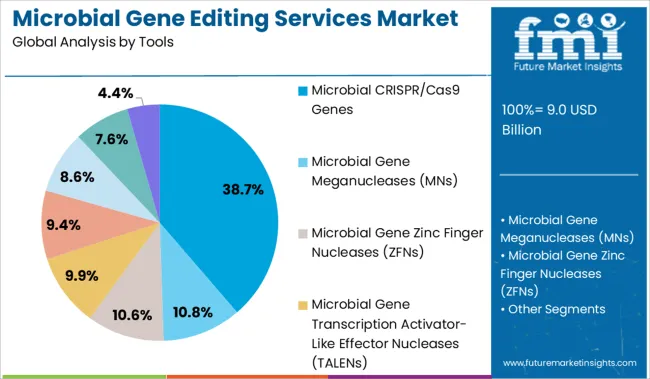
Microbial CRISPR/Cas9 genes are projected to account for 38.70% of the total revenue share in 2025, making them the leading tool in the microbial gene editing services market. This dominance is being driven by the system’s precision, efficiency, and simplicity in editing microbial genomes without off-target complications.
CRISPR/Cas9’s adaptability in modifying a broad range of bacterial and fungal strains has strengthened its role in pathway engineering and antimicrobial resistance studies. Enhanced reproducibility, scalability for industrial bioprocesses, and cost-effective implementation across contract service providers have further reinforced its widespread application.
As regulatory clarity improves and the demand for customized microbial systems grows, CRISPR/Cas9 tools are likely to maintain their leading role in both R&D and commercial-scale editing services.
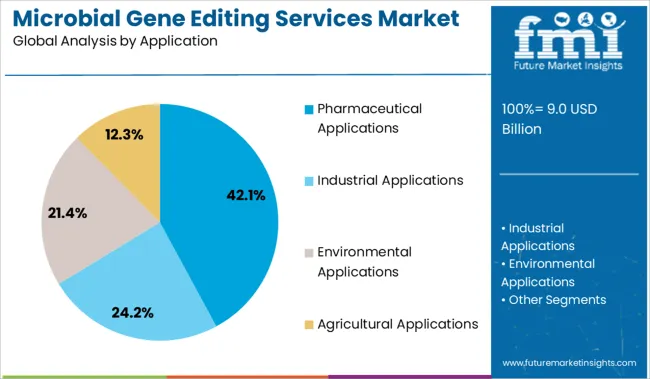
Pharmaceutical applications are expected to hold 42.10% of the microbial gene editing services market revenue in 2025, establishing it as the dominant application segment. This leadership is attributed to the growing need for engineered microbial strains in drug discovery, vaccine development, and biopharmaceutical manufacturing.
Advances in synthetic biology have enabled precise microbial genome modifications that improve therapeutic protein yields and metabolic efficiencies. Integration of gene editing tools in antibiotic development, microbiome therapy, and biosimilar production is increasing collaboration between CROs, biotech startups, and pharmaceutical giants.
Furthermore, regulatory incentives and clinical success in microbial therapeutics have increased outsourcing demand for high-fidelity, GMP-compliant editing services.
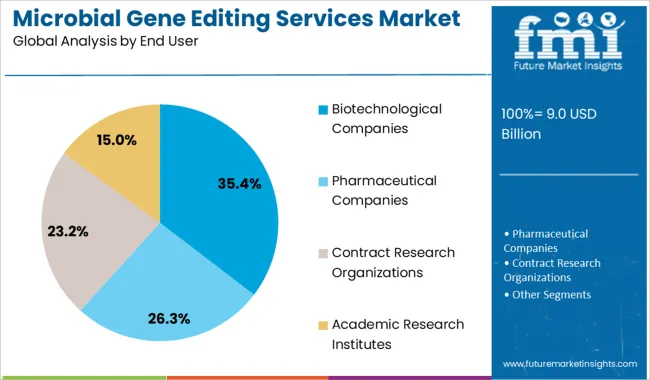
Biotechnological companies are projected to account for 35.40% of the total market share in 2025, making them the leading end user group for microbial gene editing services. Their dominance is underpinned by aggressive R&D investments, rapid technology adoption, and strategic licensing of editing platforms.
Biotech firms are increasingly relying on microbial editing to develop novel bio-based products, from enzymes and biofuels to specialty chemicals and probiotics. Their agile business models and collaborative approach to partnerships with academia and service providers have enabled quicker iteration cycles and deeper integration of gene editing workflows.
With innovation pipelines expanding across therapeutic and industrial applications, biotechnological companies remain central to market momentum and service demand.
Recent research and development in genome editing technologies hold promise in the forecast period for the development of innovative therapies. The use of genome tools has the potential to affect various therapeutic areas and hundreds of diseases, common and rare diseases which will significantly boost the market.
Over the years, Increased attention is given to the development of new antimicrobials which fight against antibiotic-resistant bacteria. For instance, Companies such as Nemesis Bioscience and Eligo Bioscience are developing antimicrobial technology and treatments with the help of CRISPR technology. Increasing government funding and the development of fast and easy methods with high efficiency spur the microbial gene editing services market in the forecast period.
Other factors like rising acceptance and increasing medical research and development for gene editing, growth of established and new gene editing tools, and rising clinical trials for diseases as diverse as muscular dystrophy, cancer, and sickle cell anemia will further drive the microbial gene editing services market. In addition to these factors, an increasing number of skilled laborers will create opportunities for the development of new tools in the future which will bring significant growth in the revenue of the microbial gene editing services market in the forecast period.
The challenges associated with the growth of the global microbial gene editing services market are variations in regulatory standards for different regions or countries. Moreover, certain limitations to the available tool and high costs associated with the editing systems might restrain the growth of the microbial gene editing services market.
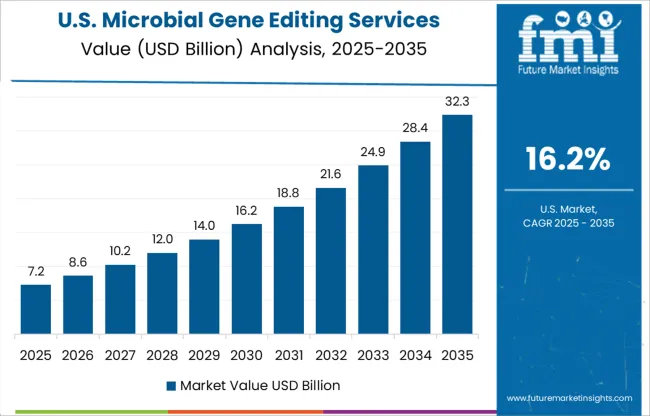
According to Future Market Insights, the North American market for Microbial Gene Editing Services holds the largest revenue share, due to increasing research and development and rising government funding for microbial gene editing research.
For instance, in 2020, The USA National Institutes of Health (NIH) announced to grant USD190 million for genome editing research. The launch of genome editing programs by NIH such as Somatic Cell Genome Editing programs which aims to develop tools for safe and effective genome editing in humans spur the market of North America in the forecast period.
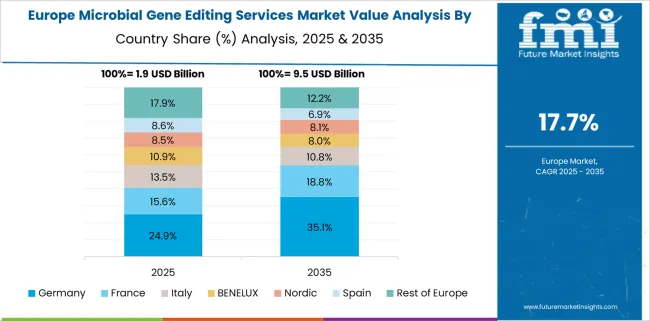
As per the FMI analysis, Europe accounts for the second largest revenue share in the global microbial gene editing services market, owing to the increasing prevalence of diseases such as HIV and Cancer and the development of new innovative technology and new drugs along with the increasing number of skilled laborers. Moreover, rapid growth is expected in the microbial gene editing services market, due to advances in technology and the establishment of scientific research groups and laboratories.
Asia Pacific is expected to witness rapid growth in the microbial gene editing services market, due to increasing awareness of gene editing services in developing countries such as India and improving healthcare infrastructure. China is expected to register significant growth in the microbial gene editing services market, due to favorable regulations and advancements in biotechnology.
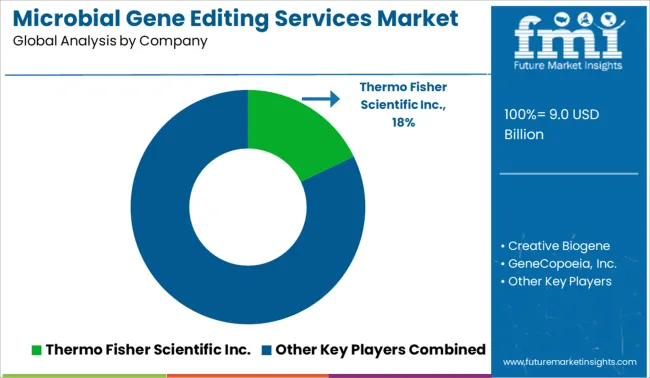
Some of the key participants present in the global microbial gene editing services market include Creative Biogene, GeneCopoeia, Inc., ProteoGenix, Thermo Fisher Scientific Inc., Vigene Biosciences Inc, Biotools Co.Ltd, Cellecta, In, NemaMetrix Inc, GenScript Biotech Corp, OriGene Technologies, Inc, Synbio Technologies LLC, ABM Inc, and Rockland Immunochemicals Inc., among others. Attributed to the presence of such a high number of participants, the market is highly competitive.
| Report Attribute | Details |
|---|---|
| Market Value in 2025 | USD 9.0 billion |
| Market Value in 2035 | USD 51.3 billion |
| Growth Rate | CAGR of 19% from 2025 to 2035 |
| Base Year for Estimation | 2024 |
| Historical Data | 2020 to 2024 |
| Forecast Period | 2025 to 2035 |
| Quantitative Units | Revenue in USD Million and CAGR from 2025 to 2035 |
| Report Coverage | Revenue Forecast, Volume Forecast, Company Ranking, Competitive Landscape, Growth Factors, Trends, and Pricing Analysis |
| Segments Covered | Tools, Application, End User, Region |
| Regions Covered | North America; Latin America; Europe; East Asia; South Asia and the Pacific; Middle East and Africa |
| Key Countries Profiled | USA, Canada, Brazil, Mexico, Germany, Italy, France, Spain, United Kingdom, BENELUX, Russia, China, Japan, South Korea, India, ASIAN, Australia & New Zealand, GCC Countries, Turkey, South Africa |
| Key Companies Profiled | Creative Biogene; GeneCopoeia, Inc.; ProteoGenix; Thermo Fisher Scientific Inc.; Vigene Biosciences Inc.; Biotools Co. Ltd; Cellecta Inc.; InVivo Biosystems; GenScript Biotech Corp.; OriGene Technologies Inc.; Synbio Technologies LLC; Abm Inc.; Rockland Immunochemicals Inc. |
| Customization | Available Upon Request |
The global microbial gene editing services market is estimated to be valued at USD 9.0 billion in 2025.
The market size for the microbial gene editing services market is projected to reach USD 51.3 billion by 2035.
The microbial gene editing services market is expected to grow at a 19.0% CAGR between 2025 and 2035.
The key product types in microbial gene editing services market are microbial crispr/cas9 genes, microbial gene meganucleases (mns), microbial gene zinc finger nucleases (zfns), microbial gene transcription activator-like effector nucleases (talens), microbial gene targetrons, microbial gene peptide nucleic acids (pnas), microbial gene triplex-forming oligonucleotides (tfos) and microbial gene structure-guided endonucleases (sgns).
In terms of application, pharmaceutical applications segment to command 42.1% share in the microbial gene editing services market in 2025.






Full Research Suite comprises of:
Market outlook & trends analysis
Interviews & case studies
Strategic recommendations
Vendor profiles & capabilities analysis
5-year forecasts
8 regions and 60+ country-level data splits
Market segment data splits
12 months of continuous data updates
DELIVERED AS:
PDF EXCEL ONLINE
Microbial Growth Monitoring System Market Size and Share Forecast Outlook 2025 to 2035
Microbial Coagulants Market Size and Share Forecast Outlook 2025 to 2035
Microbial Polyketides Market Analysis - Size, Share, and Forecast Outlook 2025 to 2035
Microbial Nucleotides Market Analysis - Size, Share, and Forecast Outlook 2025 to 2035
Microbial Fermentation Technology Market Size and Share Forecast Outlook 2025 to 2035
Microbial Lipids Size and Share Forecast Outlook 2025 to 2035
Microbial Therapeutic Products Market Size and Share Forecast Outlook 2025 to 2035
Microbial Lipase Market - Size, Share, and Forecast Outlook 2025 to 2035
Analysis and Growth Projections for Microbial Seed Treatment Business
Analysis and Growth Projections for Microbial Food Culture Business
Microbial Protein Used in Feed Market Analysis by Application, Source, and Region Through 2035
Microbial Identification Market Report – Growth & Forecast 2025-2035
Microbial Feed Additives Market – Growth, Probiotics & Livestock Nutrition
Microbial Bioreactors Market
Microbial Rennet Market
Antimicrobial HVAC Coating Market Size and Share Forecast Outlook 2025 to 2035
Antimicrobial Hospital Textile Market Forecast Outlook 2025 to 2035
Antimicrobial Glass Powder Market Forecast and Outlook 2025 to 2035
Antimicrobial Cap Fitters Market Size and Share Forecast Outlook 2025 to 2035
Antimicrobial Powder Coating Market Size and Share Forecast Outlook 2025 to 2035

Thank you!
You will receive an email from our Business Development Manager. Please be sure to check your SPAM/JUNK folder too.
Chat With
MaRIA